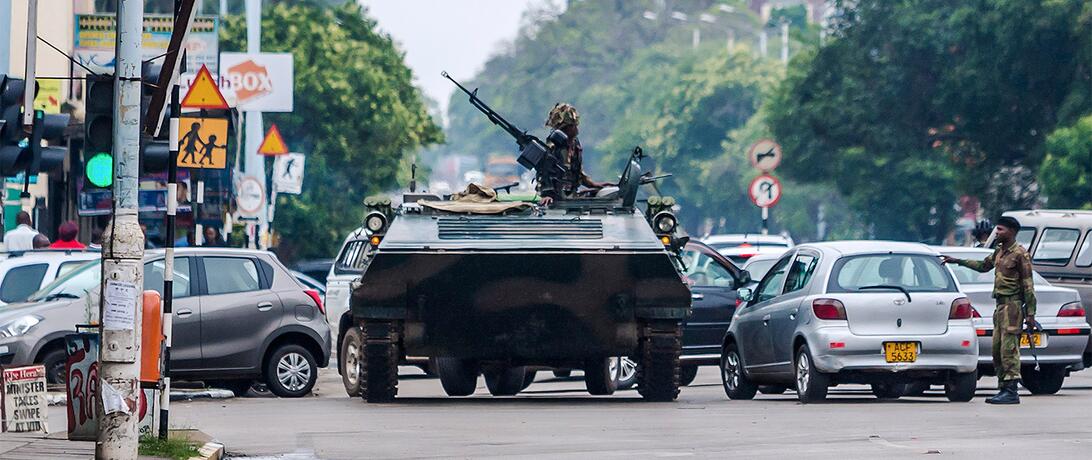
To understand the current crisis in Zimbabwe, one needs to understand the role of state-led violence and patronage as central to ensuring state legitimacy.
To understand the current crisis in Zimbabwe, one needs to understand the role of state-led violence and patronage as central to ensuring state legitimacy
Why have so many post-colonial states in sub-Saharan Africa become disappointments and failed democratic projects often resulting in coups? Although our CoupCast looks at the big picture, offering insightful coup historical trends analysis, often sudden triggers like the succession announcements emanating from Zimbabwe this week require historical contextualization.
I argue the significance of understanding the historical nature of the state, in both colonial and post-colonial form, has a significant determining effect on the politics of respective sub-Saharan African countries to the present period. In the Zimbabwean context, two trends are noted, namely use of violence and patronage as key to ensuring state legitimacy for a narrow elite.
The colonial state in Zimbabwe was born through a process of formalizing control for a narrow elite, often violently. The end of the colonial period was reached as a result of the colonial state losing legitimacy at home and abroad in its violent attempt to suppress the African population’s democratic aspirations for universal suffrage.
Faced with an inexperienced administration in 1980, I argue President Robert Mugabe has relied on violence and patronage as central to ensuring his legitimacy among Zimbabwe’s elite. The various state security agencies have been central to ensuring that, until recently, Mugabe was considered one of the world’s longest and oldest ruling leaders.
Violence for legitimacy
The use of the Zimbabwean military’s notorious North Korean trained Fifth Brigade, its War Veterans – a motley crew of freedom fighters and young opportunists – and the militarized riot police which controlled urban areas, have been vital to ensuring Mugabe’s stay in office.
Several episodes of violent and brutal repression, often with patrimonial intent, by the state security apparatus in the Mugabe era, are insightful and inform analysis of the current crisis:
- The Gukurahundi campaign (1983-1987) led by the Fifth Brigade on Mugabe’s orders, resulted in between 3,000 to 60,000 Ndebele people murdered in what is also known as the Matabeleland massacre. Gukurahundi translated from the dominant ethnic Shona grouping of which Mugabe is a part, as “the early rain which washes away the chaff before the spring rains.” It has been articulated by some as emanating from Mugabe’s early efforts toward a consolidation of state power through a realization of a one party state five years later in 1988.
- Starting in 1997, several hundred white-owned farms were seized often violently. This effort led by War Veterans from rural areas, on Mugabe’s orders, has resulted in many close to the ruling inner circle such as senior cabinet ministers and security establishment figures, benefiting. The seizure of white-owned farms has been described as central to ensuring the Mugabe regime’s survival in a period of protracted economic and political crises starting in 1989 and continuing to today.
- In 2005, Operation Murambatsvina or ‘Clear out the Filth,’ led by the Zimbabwean police forces, bulldozed and burned informal businesses in urban areas. This represented an urban ‘clean-up’ program that was responsible for affecting the livelihood of 2.4 million people who were economically active in Zimbabwe’s urban, informal economies. Critics argue those close to Mugabe were keen on gaining control of a highly lucrative black market in fuel and foreign currency trading.
Cracks begin to emerge
Starting in 2008, there have been several episodes, most recently in August 2017, of the police forces in the capital, Harare, clashing with the army – an indicator of Mugabe’s legitimacy as leader being drawn into question. More recently, it is the discussion of a power succession involving Mugabe’s wife, Grace Mugabe that has resulted in plunging his regime deeper into crisis with the firing of Vice-President, Emmerson Mnangagwa on 6 November.
A little more than a week later, the military effectively seized control of the state broadcaster and declared Mugabe was ‘safe’ and under house arrest. Reports indicate that Grace Mugabe has fled into neighboring Namibia. Several cabinet ministers said to be aligned to Grace Mugabe have also been placed under arrest. Key former Mugabe loyalists, such as the War Veterans, have declared support for the military putsch.
Reports indicate Vice-President Emmerson Mnangagwa has returned from self-imposed exile in South Africa, to lead an interim administration. It seems Mugabe’s 37-year reign over Zimbabwe is finally over. Time will tell if the Zimbabwean state can break the cycle of state-led violence and patronage serving a narrow elite at the expense of the Zimbabwean people that has been central to defining the state’s character.
Article Details
Published
Topic
Program
Content Type
News